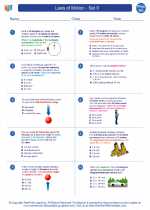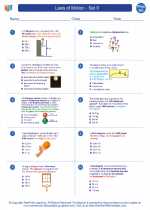Machines
A machine is a device that can change the magnitude or direction of a force to make work easier. Machines make use of simple machines, such as levers, pulleys, inclined planes, screws, and wheels and axles, to achieve this. Understanding the principles of machines and their mechanical advantage is essential in physics and engineering.
Types of Machines
- Lever: A lever is a rigid bar that pivots around a fulcrum to lift or move a load.
- Pulley: A pulley consists of a wheel with a groove that holds a rope or belt. It is used to lift heavy loads with less effort.
- Inclined Plane: An inclined plane is a flat surface that is tilted at an angle, making it easier to move objects to a higher or lower level.
- Screw: A screw is an inclined plane wrapped around a cylinder. It is used to hold objects together or to lift loads.
- Wheel and Axle: A wheel and axle use a wheel attached to a shaft (the axle) to move objects with less force.
Mechanical Advantage
Mechanical advantage is a measure of the force amplification achieved by using a tool, mechanical device, or machine system. It is calculated as the ratio of the output force to the input force. Understanding mechanical advantage is crucial in evaluating the efficiency of machines.
Study Guide
To study machines effectively, follow these steps:
- Understand the types of simple machines and their characteristics.
- Learn how to calculate mechanical advantage for each type of machine.
- Practice solving problems involving the use of machines and mechanical advantage.
- Review real-world examples of machines and their applications, such as in construction, manufacturing, and transportation.
- Explore the concept of efficiency and how it relates to the use of machines.
By mastering the principles of machines and their mechanical advantage, you will be well-equipped to tackle problems related to work, force, and energy in the field of physics.
[Machines] Related Worksheets and Study Guides:
.◂Physics Worksheets and Study Guides High School. Laws of Motion - Set II

 Worksheet/Answer key
Worksheet/Answer key
 Worksheet/Answer key
Worksheet/Answer key
